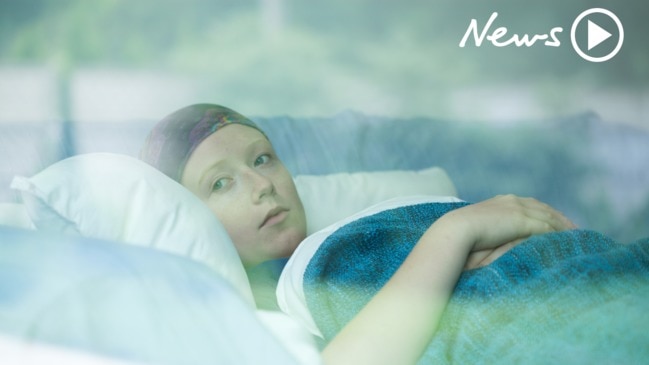Research the key to understanding cancer
Larissa Hall was diagnosed with bowel cancer at age 33. One year on, the Unley resident is cancer free and planning her wedding. She shares her story for the Cancer Council’s Daffodil Day fundraiser today.

- Cancer research and treatment is changing
- Cancer Council SA teaming up in screening campaign
- SAHMRI funding for cancer therapy facility
It was Thursday, January 25, 2018, the day before the Australia Day public holiday. I was
going into hospital for a surveillance colonoscopy after a positive FOBT (Faecal Occult Blood Test).
When I woke I was told that the colonoscopy revealed I had bowel cancer and, after further tests, it was confirmed as Stage 2.
I had no family history of cancer whatsoever. My response was: “How long do I have to live? Weeks or months?”.
I had to decide whether to have surgery to remove the tumour and, also, whether I wanted to pursue an oncofertility program.
These were surprisingly easy decisions to make - I wanted the tumour removed, and I also wanted to undergo IVF to preserve my eggs. Being young, I wanted the option to still have children.
I also agreed to have monthly Zolodex injections to put my body into early menopause and protect my ovaries from chemotherapy.
After the fertility treatments I went for an operation which saw part of my lower large
intestine removed, along with lymph nodes in the area surrounding the tumour. Soon after I began taking oral chemotherapy.
I was back at work within a week of surgery, determined to ensure that this diagnosis did not change my life to the extent I could manage it.
I learnt an enormous amount - I have a naturally curious mind and am a passionate, lifelong student of anything that captures my attention.
The tumour could have been in my system for as long as three to four years; knowing this still has bearings on my health and health consciousness today.
There was a huge body of information available and I was determined to find out as much as a could. I especially felt - and still feel - inspired by the research that has been done on cancer, genomics and oncofertility programs.
Cancer really does impact your life in so many ways.
I already was a strong-willed, passionate and adventurous person but the diagnosis boosted my courage, compassion and love for so many more aspects of my life.
It also completely centred me and gave me clarity on what was - and still is - truly important to me.
That said it was an incredibly sad and scary time, especially having the initial discussions about my diagnosis with family and friends.
After the first wave of grief passed, I became incredibly brave and resilient very quickly.
I wanted to ensure that if things didn’t go well, my family and friends were given plenty of fun memories of me for as long as I could still provide them.
The day after my diagnosis, I jumped online and visited Cancer Council’s website.
The most important resources I found talked about how to communicate my diagnosis (or not) with others, and understanding the impacts of chemotherapy treatments.
It was comforting having that information readily available.
Daffodil Day means so many things to me but, mainly, it’s a chance for me to be a voice for others who may be earlier in their cancer journey than I am, and to be compassionate and courageous for them.
Knowing the money raised goes towards cancer research is also hugely important.
Research is the future.
Cancer Council aims to raise more than $4 million nationally - including $325,000 in SA - for cancer research during its Daffodil Day appeal, through online donations, and by recruiting more than 8600 volunteers to collect in person at about 1370 sites on the day. In SA, the council will also stage Field of Hope, on North Tce, with paper daffodils for people to plant. For more information contact Cancer Council SA on 1300 65 65 85, or visit https://www.daffodilday.com.au/event/daffodil-day/home.
